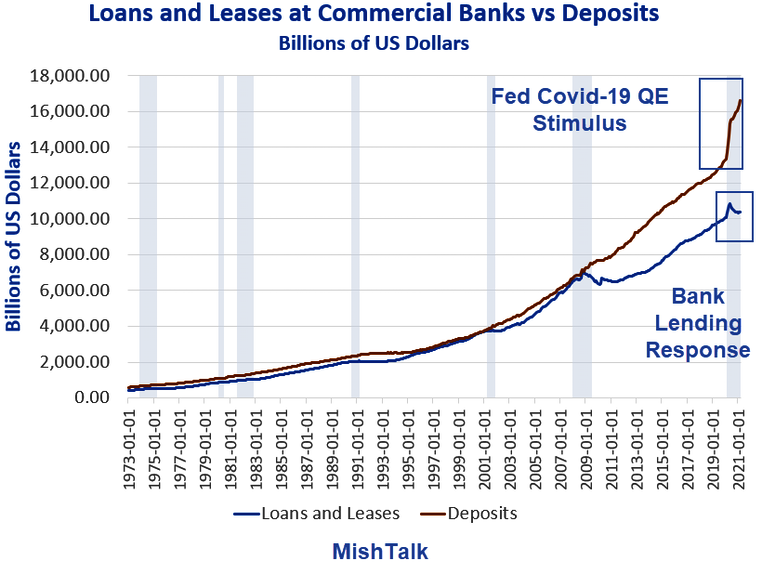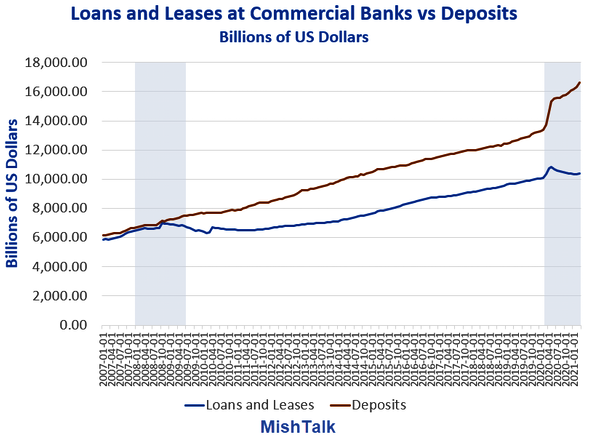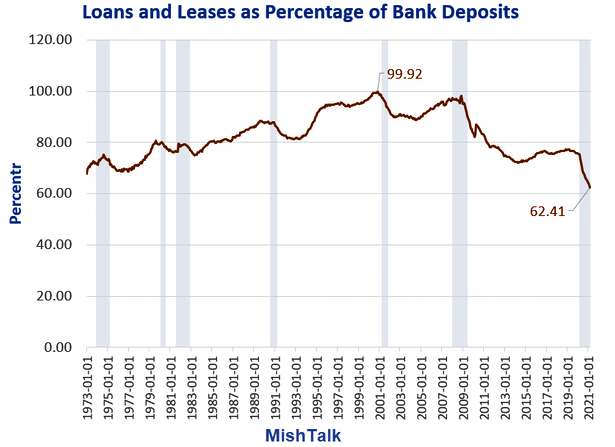The Fed's massive QE program has failed to stimulate bank lending. Let's discuss the evidence and more importantly why it's happening.

Bank Lending Since the Pandemic

What's Going On?
That's a good question and poor answers are easy to find.
For example, consider the Bloomberg headline that inspired this post: Biggest U.S. Banks Pile Into Cash, Securities as Loans Fall
The teaser: "The four largest U.S. banks sucked in a tremendous $919 billion in additional deposits last year during the height of the pandemic. Here’s what they did with it."
Three Word Synopsis
Wrong, Wrong, Wrong
Banks did not "pile into cash". Nor did they "suck in" deposits.
Rather, the Fed crammed money down the throats of commercial banks via QE policy although the banks have little demand for loans.
What's Behind the Surge in M1 Money Supply?
On Jan. 7, 2021, in What's Behind the Surge in M1 Money Supply? I explained the surge in M1 is due to QE.
I later found a confirming New York Fed article with nearly the same name. Here is the key snip from the New York Fed.
M1 growth is highly positively correlated with the growth in reserves generated by Fed asset purchases. The reason for this is simple: Reserves held with the central bank are assets for banks. As the Fed expands reserves, banks must either sell other assets (keeping the overall level of assets unchanged), issue more liabilities or equity (expanding the level of assets), or some combination of the two.
Banks Don't Lend From Reserves
The above charts are misleading in that banks do not lend from reserves in the first place.
Rather, banks lend when they believe they have creditworthy customers who seek loans. Alternatively, banks will lend if the assets pledged as collateral will cover any expected losses.
The banks can and do make mistakes regarding creditworthiness and collateral as happened with housing loans prior to the Great Recession.
There is one additional lending requirement. Banks do not lend if they are capital impaired. That is not the case here.
Bank Lending Current State of Affairs
Q: Why Aren't Banks Lending?
A: Banks do not have creditworthy borrowers who want loans.
Cramming more money down the throats of banks has not and will not stimulate lending.
The ECB also found this out in spades with their negative interest rate policy that still did not stimulate lending.
What About Housing?
Banks are largely out of the mortgage business but it would not matter if the banks got back into mortgages.
Q: Why?
A: Fannie Mae and Freddie Mac (OTC:FMCC) still make mortgage loans. Shifting the loans from Fannie and Freddie to banks would not increase net lending.
Bank Lending as a Percentage of Deposits

Hoarding the Cash?
It's important to understand that banks don't lend from deposits. The Lending actually comes first.
Nonetheless, banks are sure to be accused of "hoarding the cash" the Fed has crammed down their throats.
Why So Little Demand For Loans?
Questions are pouring in today.
Inquiring mind want to know why with interest rates so low is there so little demand for loans.
A series of questions will serve as the answer.
- Who wants to start a restaurant now?
- With more people working at home, do businesses want to expand office space?
- How are malls doing?
If housing stalls for any reason, the Fed will have a huge problem. Meanwhile, the bread and butter of bank lending has stalled.
This is yet another reason the recovery is not as good as appears on the surface.
